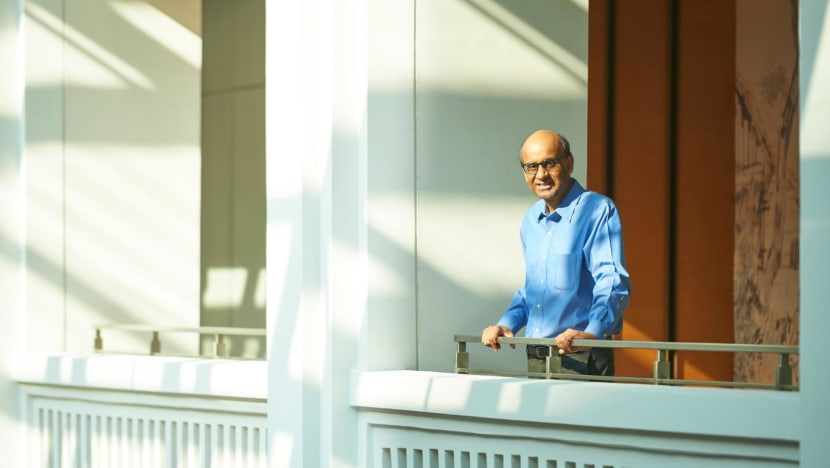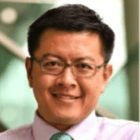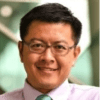Commentary: There can never be an overqualified President for Singapore
Senior Minister Tharman Shanmugaratnam’s intention to run for president has been met with comments that his talents might be wasted as a ceremonial figurehead. There can never be an overqualified president, says Eugene K B Tan, associate professor of law at the Singapore Management University.

Senior Minister Tharman Shanmugaratnam has announced his intention to run for the Singapore presidency. (Photo: Facebook/NTUC Singapore)
SINGAPORE: Much has been said and written about Senior Minister Tharman Shanmugaratnam’s experience and personal qualities since he declared on Thursday (Jun 8) his intention to contest in the sixth presidential election, which is generally expected to be held in September.
Some online reactions since then have centred around whether someone of Mr Tharman’s calibre is “overqualified” for the office, a waste of his talents.
They point to his long political career in roles such as Minister of Finance, Deputy Prime Minister, and until his upcoming resignation on Jul 7, Coordinating Minister for Social Policies, Senior Minister, and other roles such as chairman of the Monetary Authority of Singapore and deputy chairman of GIC.
His economic prowess is also internationally recognised, having become the first Asian chair of the International Monetary and Financial Committee under the International Monetary Fund from 2011 to 2014, and as the current chair of the Group of Thirty, an independent global council of economic and financial leaders.
In the weeks ahead, we cannot exclude that other hopefuls, with similarly strong credentials, will step forward and indicate their interest in contesting the presidential election.
The view that such talents are wasted as a ceremonial figurehead probably stems from a lack of proper understanding of the presidency, the demands of the office, and its vital role in our system of government and governance.
MORE THAN A CEREMONIAL FIGUREHEAD
While the presidency was indeed once an appointed and a largely ceremonial office, it has since transformed into an elected one exercising significant discretionary power.
The elected presidency is Singapore’s intra-(executive) branch system of checks and balances, instituted in 1991 when Parliament passed significant changes to Singapore’s Constitution.
One reason why some see the presidency as being limited is in the nature of that power. The president’s custodial powers are reactive and blocking in nature, rather than being policy setting and directory - something we are more accustomed to seeing in hopefuls like Mr Tharman.
The president exercises two key custodial powers enabling him or her to veto proposals determined as undermining the integrity of key public office appointments and the unjustified use of past national reserves.
A president with an electoral mandate from voters provides him or her with the authority and legitimacy to stand up to the elected government of the day in the execution of the constitutional duties.
In exercising these discretionary powers, the president is constitutionally mandated to consult the Council of Presidential Advisers (CPA). Should a presidential veto be exercised that is contrary to the CPA’s recommendation, Parliament can overrule the president through a motion supported by at least two-thirds majority of all Members of Parliament (excluding Nominated Members of Parliament).
It must be borne in mind that the elected presidency is not an alternate locus of political power in our system of constitutional government. In matters outside the purview of his custodial powers, the president acts on the advice of the Cabinet, led by the Prime Minister, which is collectively responsible to Parliament.
ELIGIBILITY CRITERIA ALREADY SELECT FOR TOP EXPERIENCE AND EXPERTISE
Comments about being overqualified for the job overlook that there are stringent eligibility criteria for presidential candidates to begin with - vital given the significant custodial powers, which are more complex than is popularly assumed.
Since the independence of Singapore in 1965, the centrality of good men and women in political leadership drives the institutional design, recruitment and promotion of public officials.
This has been reinforced constitutionally with the most extensive changes to the elected presidency in 2016, especially the enhancement of the eligibility requirements recommended by the Constitutional Commission chaired by Chief Justice Sundaresh Menon.
Stringent eligibility criteria ensure the president has, minimally, a track record demonstrating technical competence and expertise to discharge the functions and exercise the powers of the presidency appropriately and effectively.
The president will have to deal with highly technical nature matters and will require circumspection, prudence, and wisdom in balancing competing, even conflicting, interests. These range from the economic case for enormous scale financial proposals to macroeconomic concerns to assessing competency and the character of candidates for key public service appointments.
In the protective functions the president is tasked with, he or she has to deal deftly with matters relating to the maintenance of religious harmony, security, and public order as well corruption investigations.
Given the scale and magnitude of the president’s constitutional responsibilities, discretion in these areas cannot be meaningfully exercised by someone without the requisite experience and expertise. Where such powers are used indiscriminately or unwisely, the president can create serious damage to public confidence and to the country.
NOT A JOB ANYONE CAN DO
It should not be surprising that the elected presidency was conceived, and is best understood, as an institution with eligibility restricted to a select group.
In response to a parliamentary question in May, Minister-in-charge of the Public Service Chan Chun Sing stated that there were 50 public service positions that fulfil the public sector service requirement to run in the next presidential election. These include the positions of minister, chief justice, Speaker of Parliament, attorney-general, chairman of the Public Service Commission, auditor-general, accountant-general or permanent secretary.
For potential presidential candidates looking to qualify under the private sector service requirements, there were more than 1,200 companies with average shareholders’ equity at or exceeding S$500 million (US$372 million).
This, of course, does not tell us how many of these eligible individuals will have the gumption to run in a bid for the highest office in Singapore.
It does not help that in a well-governed country, many may not find compelling reasons to step forward and serve. Moreover, the president and his or her family are not exempted from public glare and scrutiny and so sacrificing that comfortable privacy may be a deterrent to seeking elected office.
Singapore’s current and past elected presidents had entered office with impressive credentials and brought their personalities to bear on the office. In that regard, the office of Singapore’s head of state has moulded into a symbol of national unity and a crucial governance guardrail.
Having a capable and wise person to represent our country internationally and to safeguard the vast national reserves is not a job anyone can do. Instead of being a promoter and protector of good governance, the presidency can expedite the road to ruin.
In my view, there can never be an overqualified president.
Eugene K B Tan is associate professor of law at the Singapore Management University and a former Nominated Member of Parliament.


















